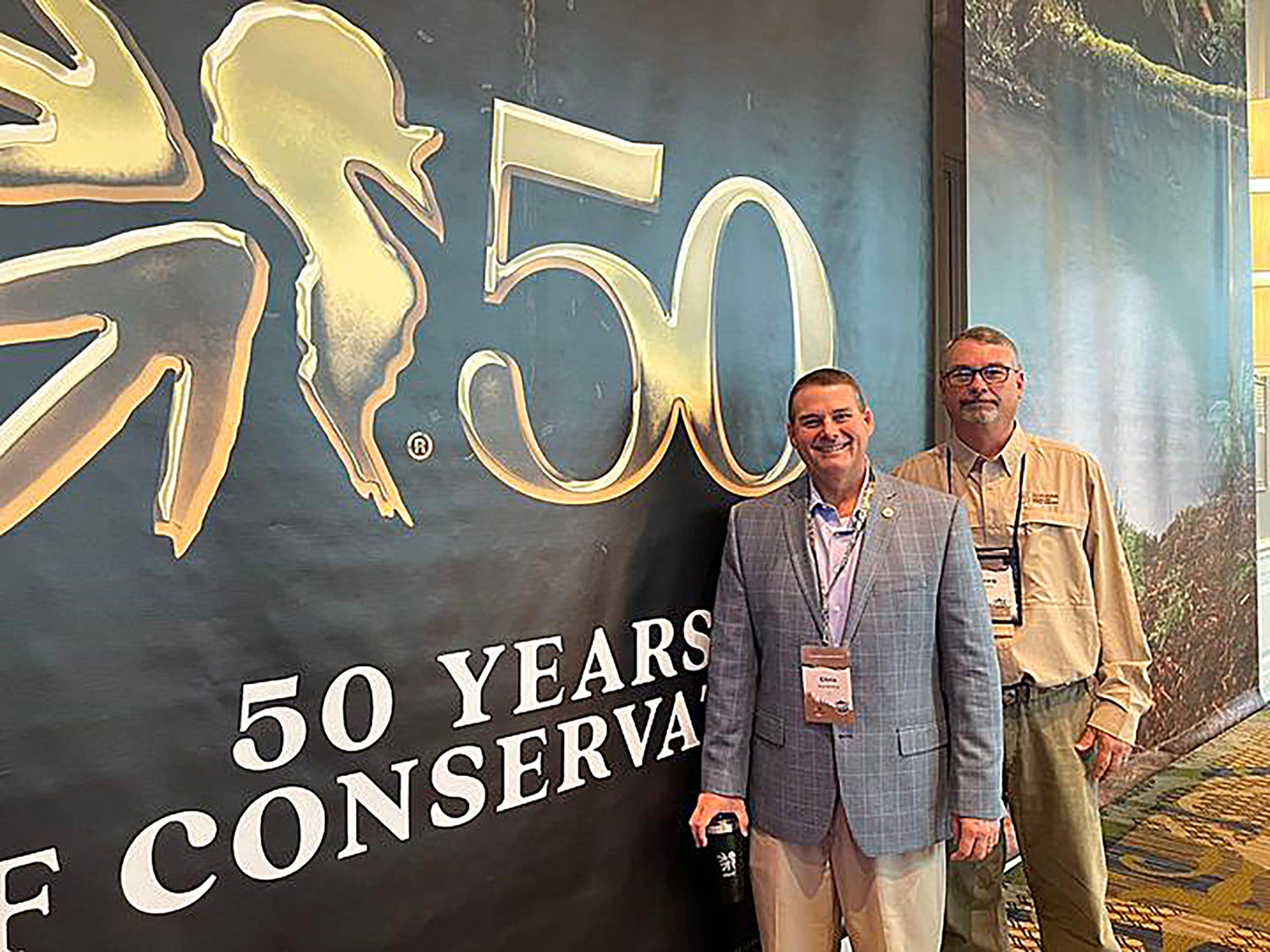By DAVID RAINER, Alabama Department of Conservation and Natural Resources
At the recent National Wild Turkey Federation (NWTF) Convention celebrating the 50th anniversary of the organization, the Alabama Chapter received the prestigious Acreage Award for land conservation in the state. In 2022, the NWTF Alabama State Chapter conserved or enhanced more acres than any other state chapter.
“We’re very proud Alabama won the award for conserving the most acres in the country last year,” said NWTF Alabama State Chapter President Craig Harris. “It was right at 146,000 acres. That’s pretty neat on the 50th anniversary to do that.”
NWTF co-CEO Kurt Dyroff added, “Our state chapters and their volunteer leadership never cease to amaze me. It is their innovation, collaboration and dedication that have allowed us to reach many milestones. It is an honor to recognize the Indiana and Tennessee state chapters with the Save the Habitat Award as well as the Alabama State Chapter with the Acreage Award, at our 50th anniversary celebration.”
Harris said the work NWTF has done over the past 50 years is mind-boggling, especially since the NWTF Hunting Heritage Super Fund was established in 1985.
“One of the biggest things that stood out to me is the fact we have funded 50,000 Super Fund projects over the years,” Harris said. “That’s just really impressive when you think about it.”
In addition to the Acreage Award, the Alabama State Chapter also received the L.A. Dixon Outstanding State Chapter Award, which is presented to state chapters in recognition of their fundraising achievement through banquets, membership recruitment and mission delivery on behalf of the NWTF. Local Alabama chapters were also recognized. The Auburn University Chapter had the highest net dollars and highest adult membership for college and university chapters, while the Henry County Longbeards and Magic City Limb Hangers joined the Grand Slam Club, and Tuscaloosa and East Alabama made the Royal Slam Club. Clay County and Turkey Heaven were recognized for fundraising, and the South Pickens Limbhangers took the award for the best first-time banquet.
Alabama Department of Conservation and Natural Resources’ (ADCNR) Chuck Sykes, Director of Wildlife and Freshwater Fisheries (WFF), attended the 50th anniversary convention in Nashville, and he was impressed by the enthusiasm and record crowd of 67,368 attendees.
“From walking the floors, there were tons of people, tons of families,” Sykes said. “A lot of people were spending money. The vendors had a good show from what I saw. Celebrating 50 years is a milestone for an NGO (non-governmental organization). Not many last that long.
“I’ve been going to the NWTF Convention for 25 years, so probably half of their existence. Long before I became Director, with my consulting business and TV show, I always had a booth at the NWTF Convention because it was my audience. It was hunters, landowners and people wanting to manage habitat for turkeys. In the beginning, NWTF was extremely instrumental in helping states restock to get turkeys to huntable levels.”
Since Sykes became WFF Director 10 years ago, he said the support from the NWTF Alabama State Chapter has made a significant impact. In 1985, NWTF developed its Hunting Heritage Super Fund program to recruit volunteers to conduct banquets and fundraisers to provide funding for conservation projects in their respective states.
“We work with a lot of NGOs,” he said. “I’ll have to say our state chapter of NWTF is as solid a partner as we could ask for, helping us buy equipment, helping us buy land and helping us with some staff positions. They really do put their money where their mouth is. When they first started the Super Fund projects, WMA (wildlife management area) biologists would send in a request for a plow, a sprayer or drip torches. The NWTF would buy them because it was a lot easier to go through an NGO than through the purchasing process. It worked really well.
“After I became Director, I met with Phil Savage, who was the NWTF state president and now a national board member and told him we were leaving money on the table. If we do this a little bit differently, we can have a bigger impact. So, instead of them going out and buying a $1,000 sprayer or $1,000 disc, they would earmark projects they wanted to fund, and they would just write the Department one check. I would make sure the projects they wanted got funded, but that provided a state match for federal funds. So, if they wrote us a check for $25,000, that basically put $100,000 to work on the ground because we could match it three to one. Since that happened, we’ve been doing a lot of good things.”








